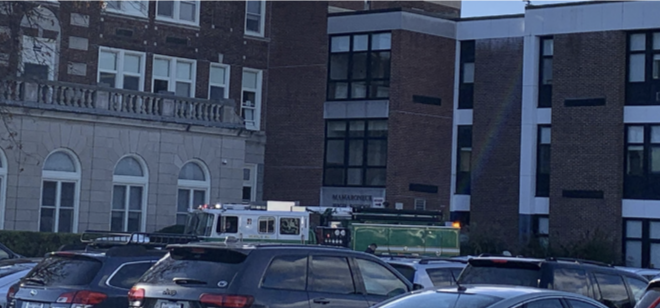The Frequent Fire Alarm Situation: A Q&A with Administration
Ever since the installation of a new fire alarm system at MHS, we have had many false fire alarms. What is going on?
A firetruck is called to the Post building during a false alarm fire procedure.
December 31, 2021
In the past two months, the beep of the fire alarm has become a familiar sound to Mamaroneck High School students and staff. While fire drills are a regular occurrence in schools, this year has undoubtedly been marked by a few additional alarms. The Globe staff spoke separately with Stephen Brugge (Mamaroneck UFSD- Director of Facilities), Assistant Principal Washington, and Principal Clain to learn about what has been going on with this integral system. The following is a collected series of responses:
Why was the new fire alarm system installed?
Brugge: “The old fire alarm system was installed in the 1990’s and was due to be replaced [and] upgraded. [So, the] new fire alarm was installed June 2020 though October 2021. It was a large project that took [a long time] to complete.”
How does the new alarm system compare to the old one?
Brugge: “The new system covers the building much better than the previous system, which is better and safer for all building occupants.”
Washington: “[It is also] much more sensitive.”
What has caused the unexpected, false fire alarms?
Brugge: “The fire alarm has been activated several times with what I suspect was from vaping in bathrooms.”
Washington: “Another [fire alarm] earlier in the school year was set off by [cooking in] Chef Luff’s culinary room. [An additional cause was] water vapor from a shower in the locker rooms.”
Clain: “None of us ever want the fire alarm to go off unexpectedly, but it’s a new system. In a perfect world we would have no kinks, but that’s not really reasonable in school the size we have. The calibrating of how sensitive these alarms are is something they’re working on. ”
How can false alarms be mitigated?
Brugge: “School administration has been responsive and diligent in sending out the message to all students that smoking and vaping is illegal and not permitted on school property.”
Washington: “[Concerning the culinary related alarm,] we are looking into having a heat sensor rather than a vapor sensor [in Chef Luff’s room].”
How should students continue to respond to the fire alarms?
Clain: “When the alarm goes off, I don’t know why it’s gone off [immediately]. You need to assume every time that it goes off that it’s a fire.”
Washington: “Just follow the procedures, leave the building as soon as possible after the fire chief gives us the ok. It’s one of the procedures we need to follow in case a real emergency happens.”
Although fire alarms can feel frustrating and disruptive, it is essential that students continue to take each one seriously. The administration is working with the student body to decrease any false alarms––students must also do their part by following school guidelines and procedures. The Globe will continue to release updates if new information is available.







